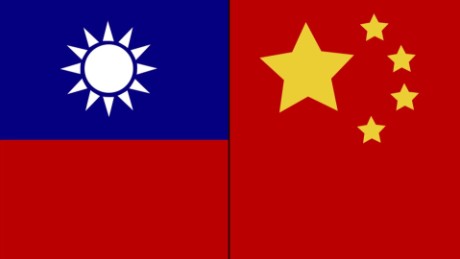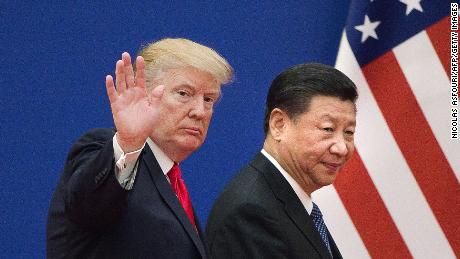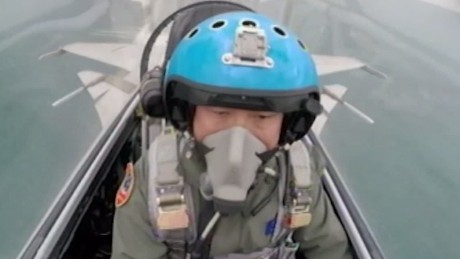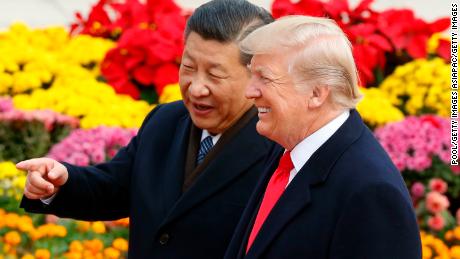Hong Kong (CNN)Beijing's push to isolate Taiwan is gathering pace, with two of the island's few remaining allies switching allegiance to China in the past month.
Taiwan isn't just taking heat from China diplomatically. Multi-national companies are being pressured over how they describe Taiwan, with Beijing insisting they follow its line that the island is an integral part of China. Shows of force by the Chinese military in the Taiwan Strait, the narrow strip of water that divides the two, are also becoming more commonplace.
This ratcheting up of tensions between China and the self-governed, democratic island opens up another fault line for Washington in its dealings with Beijing, with the Trump administration already at odds with China over trade, North Korea and the South China Sea.
Washington has signaled closer support for Taiwan and a high-profile demonstration of solidarity comes in June when the United States opens a new complex to house its de facto embassy in Taipei that's three times the size of the original building.
Here's what you need to know about the potential flashpoint.
How has China been piling on the pressure?
While Beijing has been chipping away at Taiwan's shallow bench of diplomatic allies for years, the loss of two -- Burkina Faso and the Dominican Republic -- in the space of a month is unprecedented.
Taiwan accuses Beijing of "dollar diplomacy," enticing countries to switch allegiance with cash or other incentives -- a strategy that's become easier as China's grown richer and its pockets deeper.
Beijing has also focused its attention on companies that don't toe its line on Taiwan. Some 44 airlines were recently warned not to list Taiwan separately from China on their websites and given a deadline to comply, a move the US government has described on May 5 as "Orwellian nonsense."
Most recently, Japanese retailer Muji has been fined for coat-hanger packaging that described Taiwan as a country.
China has also prevented Taiwan from attending, even as an observer, the annual meeting of the World Health Organization's decision making body for two consecutive years, a move that excludes the island's 23 million people from information that helps prevent outbreak of global diseases.
No target is too small. In the small Australian town of Rockhampton, tiny fish-shaped Taiwan flags featured on a children's art project displayed in public were painted over, reportedly at the behest of Beijing.
What's China's goal?
China and Taiwan -- officially the People's Republic of China and the Republic of China, respectively -- separated in 1949 following the Communist victory in a civil war that saw the Nationalists flee to the island.
The two sides have been governed separately since, though a shared cultural and linguistic heritage mostly endures -- with Mandarin spoken as the official language in both places.
Bringing Taiwan back to the fold has eluded China's Communist leaders for nearly seven decades and would be a huge achievement for President Xi Jinping, who now has the option to rule for life.
Chong-Pin Lin, a former deputy defense minister in Taiwan, said he believes reunification is still a long-term goal for Xi. For now, he says, Beijing is focused on deterring Taiwan from making a declaration of independence -- something that would be a huge embarrassment for Xi.
"Beijing is skillful at applying psychological pressure on Taiwan," he says.
President Tsai Ing-wen's Democratic Progressive Party has traditionally leaned in favor of formal independence from China, compared to Taiwan's other main political party, the Kuomintang, as the Nationalists are known locally.
Although Tsai has been "very prudent" since being elected in 2016 and tried to restrain the more radical wing of her party, says Lin, Beijing may feel that she will look to appeal to her base as mid-term elections near.
However, it's not just about the stick for Beijing. China has also been encouraging integration. In February, China's Taiwan Affairs Officer revealed 31 new measures to promote exchange and cooperate with Taipei, many of which make it easier for those from Taiwan to work, do business and study in mainland China, including teachers and doctors.
How does the US fit in?
Despite their unofficial nature, Taiwan's ties with the US, which provides arms to the island under the Taiwan Relations Act, appear strong.
Defying strong pressure from China, Congress passed the Taiwan Travel Act, which US President Donald Trump signed into law in March, by unanimous vote in both houses. It aims to make it easier for US officials to visit the island and Taiwan officials to visit the US.
Another bi-partisan bill aimed at ensuring Taiwan's space in the world stage isn't diminished further was launched on Friday by Republican Sen. Core Gardner and Democratic Sen. Edward Markey.
"This bipartisan legislation will help ensure that major international organizations do not turn a blind eye to our ally Taiwan simply because of China's bullying tactics," the senators said.
And when the Trump administration opens the new American Institute in Taiwan, as the unofficial embassy is called, on June 12, it's possible that high-ranking members of the Trump administration will attend.
However, in Taiwan, some analysts fear that an erratic and unpredictable President Trump may use Taiwan as a bargaining chip to extract concessions in his dealings with China on North Korea or trade.
"Taiwan-US relations are pretty good right now, but we don't know what the future holds," said Lin.
What's Taiwan doing about it?
Taiwan has long been used to operating in China's shadow.
In 1971, the Republic of China was forced to withdraw from the United Nations after a motion was passed recognizing the People's Republic as the only lawful representative of China to the UN. Many other countries followed suit, including the United States, which switched diplomatic recognition to Beijing 1979 but has maintained unofficial ties with Taipei.
Its unofficial relationships, especially with the United States, ultimately carry greater weight than its smaller, formal allies. Taiwan has representative offices, which act as de facto embassies, in more than 100 cities and a passport issued in Taiwan allows visa-free access to 148 countries, compared to 70 for China.
Many people in Taiwan barely bat an eyelid when a diplomatic ally is lost -- seeing the money the government spends on maintaining and cultivating these small countries as a waste.
What will be key is if Beijing's pressure has an impact on the island's more powerful allies, like the US, EU or Japan or on the companies that do business there.
As Beijing has ramped up pressure, Taiwan's government has been more vocal in calling out Beijing's tactics.
It has publicly criticized some companies who have bowed to Beijing's pressure. And Tsai warned of a red line in a statement issued last week in the wake of Burkina Faso's decision to ditch Taiwan.
"China's efforts to undermine our national sovereignty are already challenging Taiwan society's bottom line. This we will no longer tolerate," said President Tsai.
"We will simply redouble our resolve and continue to engage with the world."




















